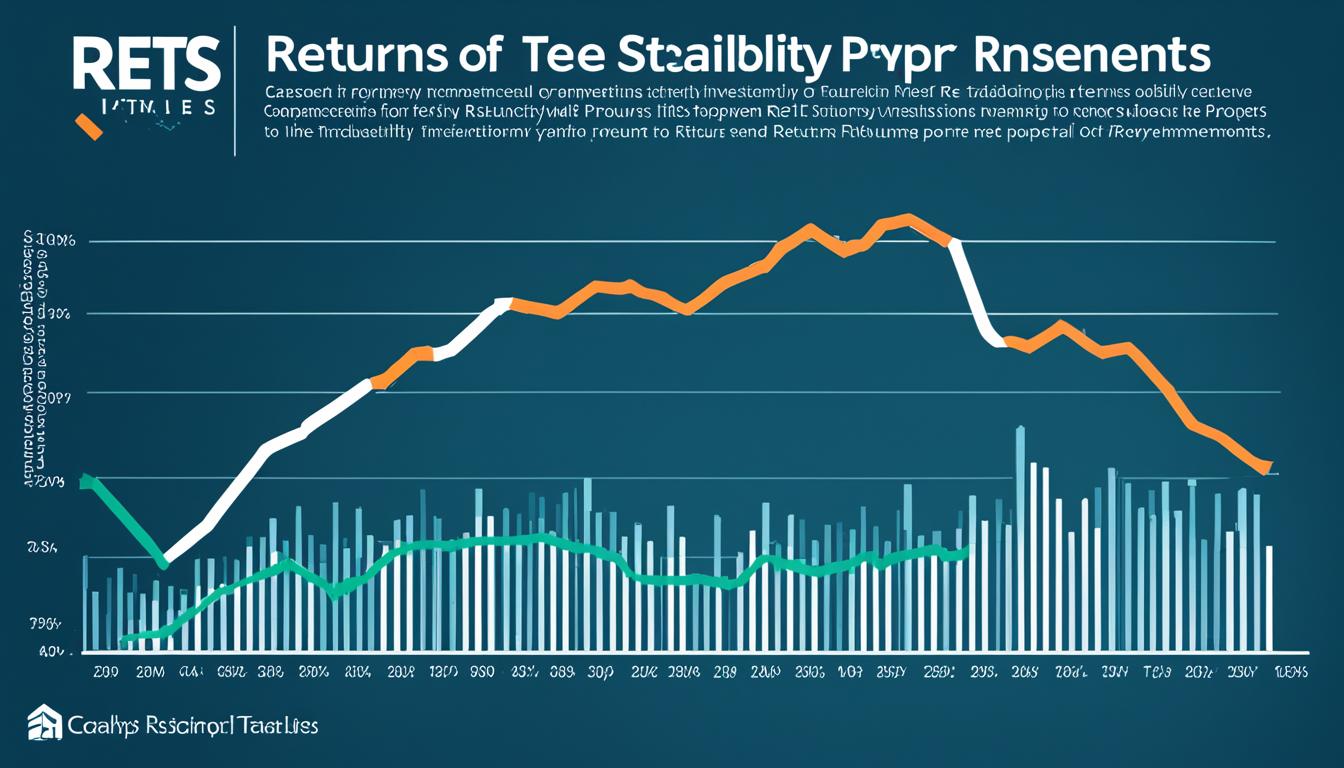Real Estate Investment Trusts (REITs) are a top pick in real estate investing. They let investors diversify their investments and earn stable returns. A REIT is a company that owns or finances income-generating real estate. Investors can join in and earn a share of the income these properties make.
REITs put money in many types of properties like apartment buildings, offices, and retail centers. This mix lowers the risk and opens doors to various real estate markets. They also pay out dividends regularly. This makes them great for investors wanting a steady income.
For a company to become a REIT, it must follow certain IRS rules. These rules include investing most of their assets in real estate and paying out most of their income to shareholders. By doing this, REITs get to avoid some taxes, like corporate income tax. They also get a deduction on their taxable income.
One big plus of investing in REITs is that they are easy to buy and sell. Unlike physical properties, you can buy and sell REITs on stock exchanges. This means you can change your investment quickly without the work of managing property or looking for buyers.
Key Takeaways:
- REITs are companies that own, operate, or finance income-generating real estate.
- They offer diversification through investments in different types of properties.
- REITs provide a steady income stream through dividends.
- To qualify as a REIT, companies must meet specific requirements set by the IRS.
- Investing in REITs offers high liquidity and flexibility.
How REITs Work
In 1960, Congress made Real Estate Investment Trusts (REITs) so regular people could invest in big real estate projects. Instead of owning a single property, you buy shares in many properties. This mix can be shopping centers, apartments, or even hotels.
REITs make money from renting out their places. They then pay that money to you as a shareholder. This way, you get income without dealing with daily property issues.
Investing in REITs lets you spread your money across different real estate areas. This mix lowers the risk, hoping that if one area doesn’t do well, others will. This mix can include offices, homes, and even warehouses.
Because most REITs are on the stock market, you can easily buy and sell their shares. This gives you quick access to your money. Also, you can check how your REITs are doing and make changes based on what you need or want.
For a company to be a REIT, it has to follow certain tax and investment rules. It must put most of its money into real estate and give a big part of its earnings to shareholders. Following these rules allows REITs to pay less in taxes.
REITs offer a way for people to earn from big, well-handled real estate, mixing real estate benefits with stock-like simplicity.
There are also mortgage REITs. They don’t own properties but loan money for real estate. They make money on the interest from these loans. This is another way to be part of the real estate world and earn money from loans.

The picture above is an example of commercial real estate. Many REITs invest in these properties to make money from rent.
Types of REITs
Real Estate Investment Trusts (REITs) come in different types. Each focuses on a specific part of the real estate market.
Equity REITs
Equity REITs are common. They own places like homes, stores, or hospitals, getting money from rent. Investors get a part of this rent as their own income.
Mortgage REITs
Mortgage REITs work by giving loans to real estate owners. They make money from the interest on these loans. This means investors can join in the real estate world through such loans.
Hybrid REITs
Hybrid REITs mix Equity and Mortgage REITs. They own properties and mortgages. This mix lets them earn from rent and loan interest, offering a diverse investment way.
Each REIT type focuses on its unique part of real estate. This lets investors pick what suits their investment needs and goals.
Investing in REITs
Choosing to invest in Real Estate Investment Trusts (REITs) offers several paths for investors. Knowing the types of REITs and their features helps make smart choices. It also helps in creating a diverse investment mix.
Publicly Traded REITs
Publicly Traded REITs are available on national exchanges, easy for individual investors to access. They can be traded like stocks, offering good liquidity. The Securities and Exchange Commission (SEC) oversees them, ensuring they are transparent and protect investors’ interests.
Public Non-Traded REITs
Public Non-Traded REITs are not on the stock exchange but are SEC-registered. They are typically more stable than their publicly traded counterparts. This stability can lead to potential long-term profits. These REITs often invest in properties to generate income and yield steady dividends.
Private REITs
Private REITs are not regulated by the SEC and are mostly for big investors. They allow investment in unique real estate projects that might not be public. Although they often require a large initial investment, they offer exclusive opportunities.
REIT Mutual Funds and REIT ETFs
REIT mutual funds and REIT ETFs are great for diversification. They hold a mix of different REITs, letting investors spread their investments. While mutual funds are managed by professionals, ETFs track an index. These investment tools are handy for adding REITs to financial strategies and saving plans.
Investors should carefully look into each type of REIT. They must review their goals, property assets, management, and the risks involved. Talking to a financial advisor and doing research is crucial. It helps in making choices best suited to individual investment strategies and risk levels.

Selecting REITs for investment opens doors to the real estate market. It allows individuals to earn from income-producing properties. Whether choosing Publicly Traded REITs, Non-Traded ones, Private REITs, mutual funds, or ETFs, every option has its benefits. With the right knowledge and research, investors can match their financial aspirations with suitable investment choices.
Advantages and Disadvantages of REITs
REITs provide a steady dividend income. This makes them great for retirement and people wanting regular income. They offer returns with risks similar to that of value stocks.
This feature is valuable for diversifying your investments. REITs’ dividends can be taxed lower, giving investors bigger income. They can also benefit from the QBI deduction, cutting taxes even more.
Yet, REITs might not grow in value as much as other types of investments. This is because they must give most of their earnings to shareholders. Thus, they can’t reinvest as much for future growth.
Investors should also keep an eye on management and transaction fees. These can eat into the returns you get. Make sure to check these costs before you invest in a REIT.
“Investing in REITs can offer investors a unique combination of income, diversification, and potential upside. However, it’s essential to thoroughly analyze the individual REIT’s investment strategy, financials, and fee structure to determine its suitability for your investment goals.” – Gary Beasley, CEO, Roofstock
In conclusion, REITs come with several benefits such as safer investment risks due to steadier returns. They can also be taxed less like unqualified dividends. However, remember their growth might be slower and they can have additional fees.

Next Steps: Assessing the Suitability of REITs for Your Investment Portfolio
When thinking about REITs, look at your investment plans and how much risk you’re okay with. This will help you decide if REITs can fit well with your other investments.
- Evaluate your investment objectives: Consider the role REITs will play in your investment strategy and the specific goals you aim to achieve through these investments.
- Assess risk tolerance: Understand your tolerance for market fluctuations and the potential risks associated with investing in real estate.
- Consider portfolio diversification: Determine how REITs fit into your overall investment portfolio and whether they will help diversify your holdings.
- Research individual REITs: Analyze the financials, investment strategy, and management team of the REITs you are considering to ensure they align with your investment objectives.
- Consult with a financial advisor: Seek guidance from a qualified financial advisor who can provide personalized advice based on your investment goals and risk tolerance.
After careful research and consultation with an expert, you’ll be better placed to decide if REITs are right for you.
How Can Investors Avoid REIT Fraud?
Investing in real estate investment trusts (REITs) can be profitable. But, it’s important to be cautious. Investors are worried about REIT fraud, a big risk. To avoid scams, it’s key to follow the SEC’s advice and do your homework well.
“Investors should be cautious of unregistered REITs and always verify the registration of both publicly traded and non-traded REITs,” advises the SEC.
The SEC’s EDGAR system is a great tool. It lets investors check if a REIT is legit with a simple search. This is a smart first step to keep yourself safe.
It’s also wise to look closely at a REIT’s financial records. The reports and prospectus can tell you lots about how well the REIT is doing and if it’s trustworthy. This step is key to understanding your investment.
Doing your due diligence before investing is crucial. Look into the REIT’s managers and their past success in real estate. Learn about the types of properties the REIT invests in and their overall strategy.
Be on the lookout for any signs of conflicts of interest within the REIT. This might include checking if transactions with related parties benefit the shareholders.
The Role of the Securities and Exchange Commission
The SEC is vital in keeping REITs in check and protecting investors. It ensures that public REITs follow certain rules to keep everything fair and clear.
Staying up-to-date with the SEC can help investors feel more secure. Their advice supports making smart investments. Always check a REIT’s background and do your own research too.

REITs can be a great addition to your investment plan. Yet, being careful and thorough is a must. Stick to the SEC’s tips and be diligent. This way, your investment stands a better chance against fraud.
Conclusion
Real estate investment trusts (REITs) are great for diversifying your investments. They let you earn steady income from dividends. You can invest in different types of properties like homes, stores, and healthcare buildings. REITs also lower your risk because they’re not closely tied to the stock market.
Investing in REITs means regular income because they pay out most of their profits. This makes them a good choice for people who want stable cash flow. Plus, they can offer good returns without as much risk. That means you can make money from something pretty safe.
But before you put your money in a REIT, do your homework. Each one is different, and they carry their own set of risks. Look closely at how they invest and who’s managing the money. This way, you can be sure your choice matches your financial plans.
FAQ
What is a Real Estate Investment Trust (REIT)?
A REIT is like a stock company. It owns, runs, or helps finance property people rent. Investors can make money from these properties.
What types of real estate do REITs invest in?
REITs put money into all kinds of real estate. This includes homes, offices, stores, and storage places.
How do REITs generate income?
They make money by leasing the properties they own. They collect rent from the people or businesses using these properties.
What are the requirements for a company to qualify as a REIT?
To be a REIT, a company must follow some rules. Most of its assets and income must come from real estate. It also must share most of its earnings with shareholders every year.
What are the advantages of investing in REITs?
REITs are good because they offer tax breaks. They also spread out the risk you take and could bring in nice profits.
Can individual investors buy and sell REITs easily?
Yes, most REITs trade on the stock market. This means you can buy them as easily as you would buy a share of a company. They are easy to buy and sell.
Are there different types of REITs?
Yes, there are various kinds of REITs. These include those that own property and others that lend money for real estate projects. Some do a mix of both.
What options do investors have to invest in REITs?
Investors can pick from many choices. These include buying stocks of REITs, mutual funds, or even trading them on the stock market like you would with other shares.
What are the potential disadvantages of investing in REITs?
Challenges might include slow growth in investments and various fees. The money you make from REITs is also taxed differently than other kinds of investments.
How can investors avoid REIT fraud?
To avoid scams, check that the REIT is registered with the SEC. Do a good amount of research before putting in your money.
What are the benefits of including REITs in an investment portfolio?
Including REITs in your mix can boost your potential earnings. They also help spread out the risk in your investments. Plus, you get money back regularly.